|
|
|
Sort Order |
|
|
|
Items / Page
|
|
|
|
|
|
|
| Srl | Item |
| 1 |
ID:
096925
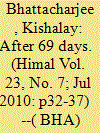

|
|
|
| 2 |
ID:
179167
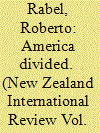

|
|
|
|
|
| Summary/Abstract |
Every four years, the world watches intently as the democratic spectacle that is an American presidential election plays out. It is not surprising. Despite a relative decline in its global standing, the United States remains the single most powerful and influential nation on Earth. The selection of its national leader matters well beyond its shores.
|
|
|
|
|
|
|
|
|
|
|
|
|
|
|
|
| 3 |
ID:
146111
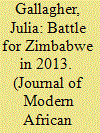

|
|
|
|
|
| Summary/Abstract |
On the face of it, the triumph of Robert Mugabe and ZANU(PF) in the 2013 elections came as a shock, not least to opposition MDC activists. However, after a period of introspection, many have begun to construct a coherent and wide-ranging account of the result which explores opposition shortcomings, and the revived relationship between the electorate and Mugabe's ZANU(PF). This article, based on interviews with political activists conducted three months after the election, outlines and attempts to explain this account. It explores the way in which a politics of polarisation that dominated Zimbabwe in recent years appears to have given way to a politics of ambivalence: where Zimbabweans once viewed their political landscape as one populated by antinomies, they now see their state and its relation to themselves in more complex and ambiguous ways. As a result, Zimbabweans' conception of the state is increasingly coming to resemble Mbembe's formulation of states as contemporaneously ‘organizers of public happiness’ and wielders of arbitrary violence.
|
|
|
|
|
|
|
|
|
|
|
|
|
|
|
|
| 4 |
ID:
074642
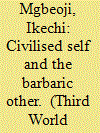

|
|
|
|
|
| Publication |
2006.
|
| Summary/Abstract |
In the aftermath of the military conflicts of 1936 - 45, there seemed to be a global renunciation of war as an instrument of state policy. Shortly thereafter, however, decades of ideological attrition between the major powers and the inherent perversion of postcolonial states reduced the solemn declarations of 1945 to ineffectual rhetoric. Underpinning the decline and demise of a human-centred approach to global peace and security is the enduring notion of the civilised self and the barbaric other. The polarisation of humanity between camps of the savage and the civilised has continued to animate international policy making despite denials. This paper argues that a rejection of the polarities is imperative for the success of the emergent concept of human security.
|
|
|
|
|
|
|
|
|
|
|
|
|
|
|
|
| 5 |
ID:
105709
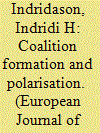

|
|
|
|
|
| Publication |
2011.
|
| Summary/Abstract |
Party ideology plays an important role in determining which government coalitions form. Research on coalition formation tends to focus on the ideological distance between coalition parties. However, the distribution of preferences within the coalition, and the legislature, also has implications for which government coalition forms - that is, a party's willingness to join a coalition depends not only on its prospective coalition partners, but also on the alternative coalitions it could form. Several hypotheses about the effects of legislative polarisation are offered and tested using data on coalition formation in 17 parliamentary democracies in the postwar period. This article also demonstrates how the traditional measure of ideological divisions within coalitions fails to capture certain aspects of ideological heterogeneity within the cabinet (and the opposition) and how Esteban and Ray's polarisation index helps in addressing these deficiencies.
|
|
|
|
|
|
|
|
|
|
|
|
|
|
|
|
| 6 |
ID:
180561
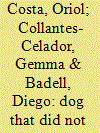

|
|
|
|
|
| Summary/Abstract |
The cosmopolitan character of the International Criminal Court (ICC) is not immune to the growing surge in the contestation of international institutions. The African Union’s reaction to the ICC decision to indict the then sitting heads of state of Sudan and Kenya, and the actions undertaken by the Trump Administration against the Court over possible investigations into Afghanistan and Palestine, are cases in point. This article explores what that surge has meant for intra-EU debates on its position towards the ICC. We present a two-fold argument based on an empirical analysis of key moments in the institutional development of the Court that coincide with the pre- and post-rise phases in the politicisation of international institutions. First, the level of agreement on the ICC within the EU has been grossly exaggerated. Second, despite bouts of disagreement, patterns of political conflict over the ICC within the EU remain constant. That is, there is recurrent polarisation, with a range of opinions on the intractable debate about Westphalian sovereignty vs. cosmopolitan justice, but no change in the other two dimensions of politicisation (salience and actor range).
|
|
|
|
|
|
|
|
|
|
|
|
|
|
|
|
| 7 |
ID:
184964
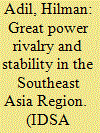

|
|
|
| 8 |
ID:
172387
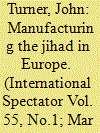

|
|
|
|
|
| Summary/Abstract |
As the Islamic State (IS) caliphate in the Middle East has collapsed, it is seeking to extend its influence elsewhere, particularly in Europe where there are existing inter-communal tensions to exploit. IS has deployed the management of savagery doctrine through acts of terrorism as part of its strategy to increase polarisation by exacerbating fear and distrust among communities, encouraging sympathies for far-right actors among non-Muslims and potentially alienating counterterrorism policies by governments, pushing Muslims out of what it terms the ‘grey zone’. The desired outcome is to drain state resources and showcase Europe as hostile to Muslims, promoting the notion of a ‘war on Islam’.
|
|
|
|
|
|
|
|
|
|
|
|
|
|
|
|
| 9 |
ID:
163641
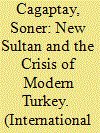

|
|
|
|
|
| Summary/Abstract |
Turkey’s deep societal polarisation is a direct result of Recep Tayyip Erdogan’s political trajectory. Prime minister of Turkey since 2003 and president since 2014, Erdogan has become the most unassailable Turkish leader since Mustafa Kemal Ataturk established modern Turkey in 1923 out of the ashes of the Ottoman Empire. A prototype of populist leaders globally, Erdogan has demonised and brutalised demographics that are not likely to vote for him, including leftists and liberals. Erdogan’s populism has helped him built a loyal base composed mostly of conservatives, many of whom he has lifted out of poverty. Accordingly, Turkey is split nearly in the middle: half the country adores him, while the other half loathes him. But, Erdogan wants to shape all of Turkey, including those that loathe him, in his own image, using his power to funnel state resources towards top-down social engineering. To this end, he has decided to push ahead, declaring himself omnipotent president. Half of Turkey though will never embrace Erdogan’s agenda and this will exacerbate Turkey’s deep political crisis.
|
|
|
|
|
|
|
|
|
|
|
|
|
|
|
|
| 10 |
ID:
117495


|
|
|
|
|
| Publication |
2012.
|
| Summary/Abstract |
Barack Obama's election as US president gave rise to hopes of radical reform. Indeed, comparisons were drawn with 1932 and there were references to 'realignment'. Many on the left were quickly disappointed by the limited character of the American Recovery and Reinvestment Act, the abandonment of proposed reforms, and the concessions that were made to ensure the passage of healthcare legislation. Some explained these failures through agency-based accounts and pointed to what they saw as personal weakness. Others stressed the structural constraints imposed by the asymmetric character of partisan polarisation, the political weight of capital, and the institutional character of the American state. The article argues that the character of the 'Obama coalition' should also be considered. It has been relatively narrow particularly when compared with the 'Roosevelt coalition'. In particular, it failed to draw business fractions into its ranks.
|
|
|
|
|
|
|
|
|
|
|
|
|
|
|
|
| 11 |
ID:
182998
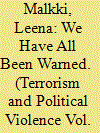

|
|
|
|
|
| Summary/Abstract |
The Capitol attack has provoked intensive debate and reflection far beyond the United States. These debates and their repercussions will be part of the legacy of the event. The article looks at the public debate on the Capitol attack in Finland and Sweden. In both countries, the Capitol attack was interpreted as a warning about the powerful consequences of sowing distrust towards democracy. The attack may inspire far-right actors to attempt to shake the democratic system in these countries too. Whether such mobilisation could succeed and gain support from within the political system seems unlikely, but not entirely impossible.
|
|
|
|
|
|
|
|
|
|
|
|
|
|
|
|
| 12 |
ID:
175454
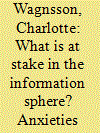

|
|
|
|
|
| Summary/Abstract |
Scholars, states and organisations have warned that authoritarian regimes and other hostile actors are projecting information to inflict harm upon others. Yet, there is little agreement on the nature of this threat. This is mirrored in the plethora of labels in use, ranging from “disinformation” to “sharp power” and “information warfare”. In order to investigate this menace further, we turn our focus to ordinary people’s anxieties, since a better understanding of threat perceptions will also provide a better understanding of the problem. We conducted a comprehensive case study comprising focus group discussions (n: 97) and an extensive survey (n: 2046) among Swedish citizens. We asked: To what extent do people worry about information influence and why? What can this tell us about the nature of this problem or threat? The empirical results suggest that respondents were first and foremost worried about societal cohesion and democracy. They also identified a risk that information influence can undermine trust in societal institutions and the EU. Based on our findings, we suggest that “malign information influence” is an appropriate label to be used in future research. Finally, we propose directions for future systematic research on how malign information infuence is received and processed in different national contexts.
|
|
|
|
|
|
|
|
|
|
|
|
|
|
|
|
|
|
|
|
|